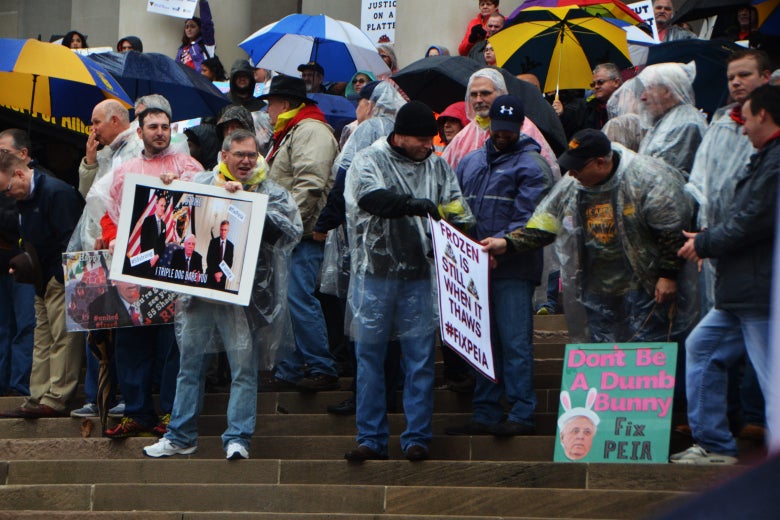WORLD SOCIALIST WEB SITE
 Teachers, school service workers, and labor supporters rally at the West Virginia state capital building in Charleston on Feb. 17. PHOTO/Rich McGervey/Flickr/Slate
Teachers, school service workers, and labor supporters rally at the West Virginia state capital building in Charleston on Feb. 17. PHOTO/Rich McGervey/Flickr/Slate
The growing wave of working-class unrest in the United States and internationally is exposing and clarifying basic political questions. Among them is the central purpose of the campaign by the tech giants, the US government and the mass media to censor the Internet, under the fraudulent pretense of combating “fake news” and “Russian meddling.” The real aim is the suppression of social opposition.
This week is opening with an expanding number of working-class struggles. Although the unions managed to sell out and end the nine-day strike of 30,000 West Virginia teachers and school employees last week, the rebellion of educators across the US is spreading. Teachers in Oklahoma, Kentucky and Arizona—organizing chiefly through Facebook groups that have added tens of thousands of users in the last few weeks—are pressing for West Virginia-like strikes to demand higher pay and secure pensions.
This is part of a broader movement of the working class, including a strike by 1,400 Frontier telecommunications workers in West Virginia and Virginia, and a strike mandate vote by 18,000 registered nurses at hospital giant Kaiser Permanente in California. Although the contract for a quarter of a million United Parcel Service workers does not expire until midsummer, thousands of workers are using social media to press for strike action.
In the United Kingdom, more than 40,000 lecturers are in the fourth week of strikes at 65 universities across the country. In Denmark, the right-wing government has responded to a threat by 80,000 public sector workers to strike on April 4 by announcing that it will lock out all 400,000 state employees in what the Danish media says would be the “worst industrial disruption in decades.”
Within the ruling class, there are growing warnings about the way workers have used the Internet to organize their struggles and escape the stranglehold of the corporatist, anti-working-class trade unions.
In their four-decade-long string of unending betrayals, the unions have depended on a monopoly of information and the isolation of workers to lie, threaten and browbeat workers to submit to concessions. This is beginning to break down. In particular, social media platforms have allowed workers in different sectors and countries to communicate directly with each other, organize protests and share information.
The New York Times, in an article published March 8 (“West Virginia Walkouts a Lesson in the Power of a Crowd-Sourced Strike”) comments worriedly that West Virginia teachers “found ways to organize and act outside the usual parameters of traditional unionism. Teachers and service workers across the state aired their frustrations in an enormous Facebook group, and their walkout ultimately included members of three different unions and many people who did not belong to a union.”
The rebellion of teachers against the back-to-work order from the unions “was a crucial turning point, and a telling one,” the Times writes. “[T]he rank and file, not union leaders, came to call the shots.”
“Unions have tended throughout most of their histories to be forces that seek stability, not unrest,” Joseph A. McCartin, a labor historian at Georgetown University told the Times, “When they are weakened, we’re more likely to see the reemergence of instability and militancy, and the kind of model that we’re seeing happen in West Virginia.”
In justifying their demands that Facebook, Google and other Internet companies take aggressive measures to censor content online, the Democratic Party and the intelligence agencies have claimed that Russia is propagating “fake news” in order to “sow discord” and “divisions” in the United States. As the WSWS has noted, however, and as ongoing developments prove, “discord” does not need to be “sown”; it exists, and it is busting out in the open.
By associating popular opposition with “Russian meddling,” the ruling class is seeking to criminalize all political dissent and censor free speech on the Internet. With the growth of the class struggle, the campaign to censor the Internet will only escalate and take ever-more overt forms, in the US and internationally.
In the media, there are growing efforts to demand explicit restrictions on left-wing views as part of a campaign against “extremism.” The New York Times published a column Sunday (“YouTube, the Great Radicalizer”) complaining that YouTube’s algorithms are directing people to “leftish conspiratorial…arguments about the existence of secret government agencies.” The author, Zeynep Tufekci, from the Berkman Center for Internet and Society at Harvard University, complains that “YouTube [which is owned by Google] may be one of the most powerful radicalizing instruments of the 21st century.”
“Human beings have many natural tendencies that need to be vigilantly monitored in the context of modern life,” Tufekci writes, associating interest in left-wing politics with addiction to sugar and fatty foods. “The situation is especially dangerous given how many people—especially young people—turn to YouTube for information.”
She concludes her brief for authoritarian control of what people are viewing on line: “This state of affairs is unacceptable but not inevitable.” In other words, greater censorship methods are required.
World Socialist Web Site for more